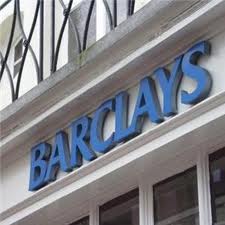Barclays Bank leads a core of 737 transnational
companies (TNCs) that are holding the world’s economy at ransom, a study by
three Swish economic researchers reveals.
A TNC, according to the Organisation of Economic
Co-operation and Development (OECD) is a firm which ‘comprise companies and
other entities established in more than one country and so linked that they may
co-ordinate their operations in various ways’.
The study titled The Network of Global Corporate
Control done by Stefani Vitali, James Glattfelder and Stefano Battiston of the
Swiss Federal Institute of Technology in Zurich released last year confirms the
existence of a cartel driving global capitalism by its involvement in
activities which undermine the global economy.
The 747 TNCs own or control, through shareholding, 80%
of businesses while another core of 147 TNCs which the researchers call the
‘super entity’ owns or controls 40% of businesses.
Leading this super entity’s top 10 is Barclays Bank
followed by Capital Group Companies Inc, FMR Corporation, AXA, State
Street Corporation, JP Morgan Chase & Co, Legal & General Group plc, Vanguard
Group Inc, UBS AG and Merrill Lynch & Co Inc.
This is the super entity to which the researchers say
‘control flows to a small tightly-knit core of financial institutions’.
“This core can be seen as an economic ‘super-entity’
that raises new important issues both for researchers and policy makers,” the
researchers say in their abstract.
“The structure of the control network of transnational
corporations affects global market competition and financial stability,” they
point out.
The study shows the ‘architecture of the international
ownership network, along with the computation of the control held by each
global player’.
“We find that transnational corporations form a giant
bow-tie structure and that a large portion
of control flows to a small tightly-knit core of financial institutions,” they
further say.
Vitali, Glattfelder and Battiston describe the bow-tie
structure as one made up of ‘strongly connected component’ of TNCs which own
‘directly and/or indirectly shares in every other member’.
Such a structure is a means of ‘preventing take-overs,
reducing transaction costs, risk sharing and increasing trust between groups of
interest’.
The researchers also note that this structure ‘weakens
market competition, reduces over-all employment and leads to excessive
pricing’.
Some of the companies are involved in illegal arms deals,
food speculation to push up prices and, according to CorpWatch founder
Joshua Karliner, ‘have
become some of the most powerful economic and political entities in the world
today’.
CorpWatch is an
organisation which ‘investigates and exposes corporate violations of human
rights, environmental crimes, fraud and corruption around the world’.
In
his 1997 book, The Corporate
Planet: Ecology and Politics in the Age of Globalization, Karliner says more
than half TNCs come from just five nations: France, Germany, the Netherlands,
Japan and the United States.
“But,” he states, “despite their growing numbers,
power is concentrated at the top. That accounts for one-quarter of the world’s
productive assets.”
Below are some of the activities the TNCs engage in:
· Account for the world’s industrial
capacity, technological knowledge, international financial transactions and
power
· They control mining, refine and distribute
most of the world’s oil, gas, diesel and jet fuel
· They built most of the world’s oil, gas,
coal, hydroelectric and nuclear power plants
· They extract most of the world’s minerals,
manufacture and sell most of the world’s cars, aeroplanes, communications
satellites, computers, home electronics, chemicals, medicines and biotechnology
products.
Transnational corporations hold 90% of all technology and product
patents worldwide and are involved in 70% of world trade. More than 30% of this
trade is ‘intra- firm’ which means it occurs between units of the same
corporation
· They harvest much of the world’s wood and
make most of its paper
· They grow many of the world’s major
agricultural crops and process much of it
· They work together with their governments
to reorganize the world economic structures and balance of power through a
series of intergovernmental trade and investment accords. The treats serve as
frameworks for globalisation
· They work to circumvent national government
because most border and regulatory agencies are succumbing to the power and
influence of TNCs. As a result, most TNCs are stateless and cannot be
accountable to any government
· They influence both domestic and foreign
policies
The list of 50 top TNCs
1 Barclays Plc, Great
Britain
2 Capital Group
Companies Inc, US
3 FMR Corp, US
4 AXA, France
5 State Street
Corporation, US
6 JP Morgan
Chase & Co, US
7 Legal &
General Group Plc, Great Britain
8 Vanguard
Group, Inc., US
9 UBS AG China
10 Merrill
Lynch & Co., Inc. US
11 Wellington
Management Co. L.L.P, US
12 Deutsche
Bank AG Germany
13 Franklin
Resources, Inc., US
14 Credit
Suisse Group, China
15 Walton
Enterprises LLC, US
16 Bank of New York
Mellon Corp., US
17 Natixis, France
18 Goldman
Sachs Group, Inc., US
19 T. Roweprice
Group, Inc., US
20 Legg Mason, Inc.,
US
21 Morgan
Stanley, US
22 Mitsubishi UFJ
Financial Group, Inc. Japan
23 Northern
Trust Corporation, US
24 Société
Générale, France
25 Bank OF
America Corporation, US
26 Lloyds TSB Group
plc, Great Britain
27 Invesco Plc,
Great Britain
28 Allianzse,
Germany
29 TIAA, US
30 Old Mutual
Public Limited Company, Great Britain
31 Aviva plc,
Great Britain
32 Schroders Plc,
Great Britain
33 Dodge & Cox,
US
34 Lehman
Brothers Holdings, US
35 Sun Life
Financial, Canada
36 Standard Life
Plc, Great Britain
37 CNCE, France
38 Nomura
Holdings, Inc, Japan
39 The
Depository Trust Company, US
40 Massachusetts
Mutual Life Insurance, US
41 Inggroep N.V.
Netherlands
42 Brandes
Investment Partners, L.P, US
43 Unicredito
Italiano, Spain
44 Deposit
Insurance Corporation of Japan
45 Vereniging
Aegon, Netherlands
46 BNP Paribas, France
47 Affiliated Managers
Group, Inc, US
48 Resona
Holdings, Inc, Japan
49 Capital
Group International, Inc, US
50 China
Petrochemical Group Co. Canada
Sources: planetsave and helaxendria

No comments:
Post a Comment